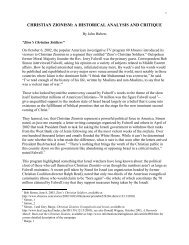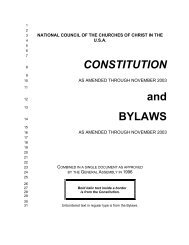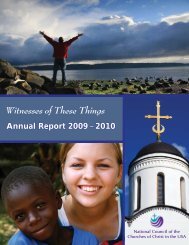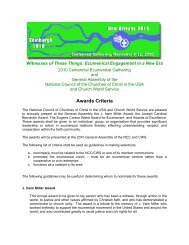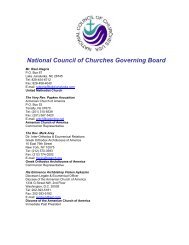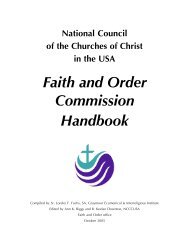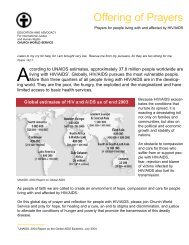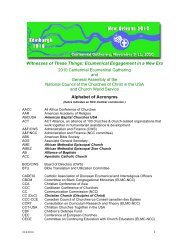Common Agreement on Mutual Recognition of Baptism - National ...
Common Agreement on Mutual Recognition of Baptism - National ...
Common Agreement on Mutual Recognition of Baptism - National ...
Create successful ePaper yourself
Turn your PDF publications into a flip-book with our unique Google optimized e-Paper software.
296<br />
297<br />
298<br />
299<br />
300<br />
301<br />
302<br />
303<br />
304<br />
305<br />
306<br />
307<br />
308<br />
309<br />
310<br />
311<br />
312<br />
313<br />
314<br />
315<br />
316<br />
317<br />
318<br />
319<br />
320<br />
321<br />
―sacrament‖ or ―mystery‖ celebrated by the Church each day in the liturgy. Perhaps the most<br />
influential am<strong>on</strong>g these theologians, however, stands the North African bishop, Augustine <strong>of</strong><br />
Hippo (354-430), for whom physical realities were the windows through which the spiritual<br />
realities reach us. 5 Augustine also has a notable chapter in the tenth book <strong>of</strong> The City <strong>of</strong> God that<br />
essentially exegetes the meaning to Rom. 12:1-3. There he argues that the communi<strong>on</strong> <strong>of</strong><br />
Christian lives given in love is <strong>of</strong>fered to God as its sacrifice through Christ ―the great High<br />
Priest (sacerdotum magnum, Cf. Hebrews 4:14 et pass.) who <strong>of</strong>fered himself to God in His<br />
passi<strong>on</strong> for us.‖ Augustine then closes the chapter by asserting that [t]his is the sacrifice <strong>of</strong><br />
Christians: the many, the <strong>on</strong>e body in Christ. And this likewise is the sacrifice that the church<br />
repeatedly celebrates by the sacrament <strong>of</strong> the altar, noted by the faithful, in which she shows that<br />
she herself is <strong>of</strong>fered in the <strong>of</strong>fering that she makes to God. 6<br />
The two senses <strong>of</strong> sacrament, as Jesus himself and as the sacraments <strong>of</strong> the church,<br />
c<strong>on</strong>tinued into the medieval period and Latin theologians gradually synthesized the two ideas <strong>of</strong><br />
sacrament into an integrated theology. The basic medieval c<strong>on</strong>cept was that the church is the<br />
body <strong>of</strong> the crucified, resurrected, and glorified Lord, and God‘s grace c<strong>on</strong>tinues to come to us<br />
through Christ just as it did in the incarnati<strong>on</strong>. Only now the grace that comes through Christ<br />
comes through the sacraments, most especially the Eucharist, by which Jesus Christ c<strong>on</strong>tinues to<br />
be present in the church. Thomas Aquinas (1224-1274), for example, gave a thorough<br />
expositi<strong>on</strong> <strong>of</strong> eucharistic theology and sacrifice (cf. Summa Theologica, III, 73-83) that was a<br />
feature <strong>of</strong> an entire ecclesial world-view that was, so to speak, eucharistic: 7 The whole world<br />
was related to and dependent up<strong>on</strong> the grace <strong>of</strong> God, known in creati<strong>on</strong>, proclaimed in salvati<strong>on</strong><br />
history, and present <strong>on</strong>ce and still in Jesus Christ, Word made flesh, the <strong>on</strong>e mediator, who has<br />
united believers into his reign, the Body <strong>of</strong> Christ. Into this triune God <strong>on</strong>e was baptized, and by<br />
the very being <strong>of</strong> this God <strong>on</strong>e was nourished during life‘s spiritual journey. Christ instituted the<br />
Eucharist, argued Thomas, because he desired to remain present in the church, in a sacramental<br />
manner available to faith, unlike a mere corporeal presence available to the senses. The whole<br />
5 For a summary <strong>of</strong> Augustine <strong>on</strong> sacrament as a sacred sign, see Finkenzeller, Lehre, 39-43. For a wider treatment,<br />
see Edward J. Kilmartin, S.J., The Eucharist in the West, ed. Robert J. Daly, S.J. (Collegeville, MN: The Liturgical<br />
Press, 1998), 3-61.<br />
6 De civitate dei 10.6; CSEL 47.278-9. Hoc est sacrificium christianorum: multi unum corpus in Christo. Quod<br />
etiam sacramento altaris fidelibus noto frequentat ecclesia, ubi et dem<strong>on</strong>stratur, quod in ea re, quam <strong>of</strong>fert, ipsa<br />
<strong>of</strong>feratur (CSEL 47.279.52-55)<br />
7 For a summary <strong>of</strong> Aquinas‘s eucharistic teaching, and bibliographic references, see David N. Power, The<br />
Eucharistic Mystery (New York: Crossroads, 1994), 163-240, esp. 208-240 (also see, 269-290). For a thorough<br />
entrance to the vast literature <strong>on</strong> Thomas Aquinas, see Otto Pesch, ―Thomas v<strong>on</strong><br />
Aquino/Thomismus/Neuthomismus,‖ in Theologische Realenzyklopädie (New York; Berlin: Walter de Gruyter,<br />
2002). In English, see Thomas O‘Meara, The Theology <strong>of</strong> Thomas Aquinas (Notre Dame, IN: University <strong>of</strong> Notre<br />
Dame Press, 1997), particularly the annotated bibliography, 290-296. Also see, Kilmartin, Eucharist in the West ,<br />
247-266; Erwin Iserloh, ―Abendmahl: III/2. Mittelalter,‖ Theologisches Realenzyklopädie (Berlin: Walter de<br />
Gruyter, 1977), 1:95-97; E. Mangenot, ―Eucharistie du XII e a la fin du XV e siécle,‖Dicti<strong>on</strong>naire de théologie<br />
catholique (Paris, 1913), 5:1304-1320, passim. For excellent shorter studies, more accessible to those not trained in<br />
scholastic theology, see Owen Cumings, ― Medieval Eucharistic Theology,‖ Emmanuel (March, 1993): 73-79; Gary<br />
Macy, The Banquet’s Wisdom (New York: Paulist Press, 1992), 104-109; Herbert McCabe, ―Eucharistic Change,‖<br />
Priests & People 8/6 (1994): 217-221; Raym<strong>on</strong>d Mol<strong>on</strong>ey, The Eucharist (L<strong>on</strong>d<strong>on</strong>: Ge<strong>of</strong>frey Chapman, 1995),<br />
139-150; David Power,―Eucharist,‖ in Systematic Theology II: Roman Catholic Perspectives, ed. Francis Schüssler<br />
Fiorenza, John P. Galvin (Minneapolis: Fortress Press, 1991), 277-280. For an informative Catholic perspective <strong>on</strong><br />
the sacraments in general, and thus the place <strong>of</strong> Thomas within this development, see Regis A. Duffy, ― Sacraments<br />
in General,‖ in Systematic Theology II, 183-210.<br />
8



